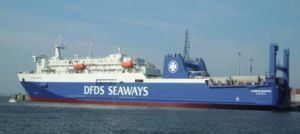News
Business News in Brief: Migrant stowaways on DFDS ferry left in limbo
This article is more than 8 years old.
In other news, artificial spider silk, new diabetes centres and indoor vegetables hit the headlines

Someone has to cut the Gordian knot to allow these migrants ashore (photo: DFDS Seaways)
For five weeks now, the Danish shipping company DFDS has found itself in a legal stalemate regarding 12 migrants that stowed away on a ferry between Turkey and Ukraine.
The stowaways are at present locked in their cabins because it has not been possible to find a country to take them and because they could be a potential danger to themselves or to the ship.
Some of them have already threatened to commit suicide by jumping overboard.
No papers
One of the difficulties is that the stowaways have no identification papers. When questioned, they claim to be stateless Palestinians, but DFDS thinks that they are probably from either Algeria or Morocco.
Normally, the stowaways would be eligible to seek asylum either in Turkey or Ukraine, but neither of these countries are willing to accept them – as they should, according to internationally-agreed conventions.
“At the moment, everyone is washing their hands of the problem. Nobody wants to allow these poor people to come ashore so that they be properly processed as asylum seekers, or whatever else they want,” Niels Smedegaard, the CEO of DFDS, told TV2 News.
As the ship is sailing under a Lithuanian flag, they could eventually end up there. DFDS is in close contact with the authorities in Lithuania, but up to now, no solution seems in sight.
Quantum computer partnership launched
In a ceremony today, Microsoft and the University of Copenhagen will sign a unique partnership agreement to develop a quantum computer. The device makes direct use of quantum-mechanical phenomena such as superposition and entanglement to perform operations on data. Quantum computers are different from binary digital electronic computers that are based on transistors. Among those attending the ceremony will be David Pritchard, COO for AI and research at Microsoft, Søren Pind, minister of education and research, and the leader of the Niels Bohr Institute, Jan W Thomsen.
Two new diabetes centres planned
The Novo Nordisk Fund has allocated 1.4 billion kroner to open treatment centres for diabetics in Aarhus and Odense. The centres will not only be for treating patients but will also encompass research and educational functions. Building work is expected to start next year and the centres are expected to be ready by 2022. Yearly, the centres could handle 8-9,000 patients.
Artificial spider silk could soon be a reality
Researchers at the University of Southern Denmark (SDU) are investigating the properties of silk from orb-weaver spiders. The silk will be ‘harvested’ a couple of times a month so that the researchers can unlock the secret of its immense strength. The intention is to produce artificial spider silk that is just as strong as the real thing for use in such things as bulletproof vests. These could then be made much lighter than they are at present.
Growing food by computer
New ways of growing food are needed if we are to meet increasing demands and it also has to be done sustainably. A Danish company, Next Food, has come up with a revolutionary idea to grow vegetables indoors without using earth and using only a small amount of water. The amount of light and water is carefully controlled by a computer that knows the precise needs of each individual plant. Even the taste, texture and appearance can be programmed in and the beauty of the system is that you don’t need to know anything about plants to use it; you just plug in, go to an app and specify your requirements.










































